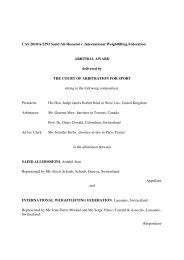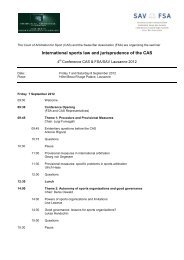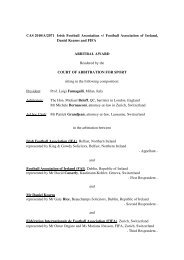(CAS) Bulletin - Tribunal Arbitral du Sport / TAS
(CAS) Bulletin - Tribunal Arbitral du Sport / TAS
(CAS) Bulletin - Tribunal Arbitral du Sport / TAS
You also want an ePaper? Increase the reach of your titles
YUMPU automatically turns print PDFs into web optimized ePapers that Google loves.
waiting until the eve of the AGM 2010 before<br />
informing the Appellant that its expulsion would<br />
be sought on the basis of facts which had come to<br />
the Respondent’s knowledge weeks before. Even less<br />
could it justify the Respondent’s refusal to provide<br />
the Appellant with the documents on which the<br />
Resolution was taken, even after being expressly<br />
requested to do so on both 16 and 17 October 2010.<br />
This course of action constituted a severe violation of<br />
the Appellant’s right to be heard.<br />
Unlike in other cases (see <strong>CAS</strong> 2004/A/714, para.<br />
11 or <strong>CAS</strong> 1920/A/2009, para. 87 with further<br />
references), the de novo proceedings before <strong>CAS</strong> (in<br />
accordance with R57 of the <strong>CAS</strong> Code) cannot be<br />
deemed to have cured the violation of the Appellant’s<br />
right to be heard. The vote taken by the AGM 2010<br />
on the Resolution is not a decision which was largely<br />
determined by legal standards and which the Panel<br />
could therefore take in lieu of the delegates.<br />
Article 6 para. 1 of the EGA Constitution reads as<br />
follows:<br />
“All members shall observe the Constitution and Rules of<br />
the Association. In the event of their violation any member<br />
may be expelled by a majority of two-thirds of those present<br />
and represented voting at an Annual General Meeting or an<br />
Extraordinary General Meeting”.<br />
Article 6 para. 1 of the EGA Constitution might or<br />
might not stipulate that the facts presented to the<br />
delegates by the Respondent’s Secretary General<br />
justifi ed the expulsion of the Appellant (this can be<br />
left open here). In any event, it is still very much a<br />
“political” decision within the discretion of the<br />
delegates whether or not to expel a member. In<br />
particular, it follows from the wording of Article 6<br />
para. 1 of the EGA Constitution (“may be expelled”,<br />
emphasis added) that the delegates certainly did not<br />
have a legal <strong>du</strong>ty to vote in favour of the Appellant’s<br />
expulsion.<br />
As has been established in the case <strong>CAS</strong> OG 96/005,<br />
paras. 10 et seq.<br />
“ the Panel’s function is to review the propriety, in the broadest<br />
sense, of the decision of the decision maker; it is not to become<br />
the decision maker itself. […] There are, of course, exceptional<br />
cases when a body such as this Panel, can overlook a clear<br />
departure from <strong>du</strong>e process because it can determine that the<br />
decision would have been the same in any event; i.e. that there<br />
was nothing that the victim of the decision could have said to<br />
persuade a reasonable decision maker to change his mind. But<br />
the law has always recognized that such cases are rare […] ”<br />
Pursuant to Article 6 para. 1 of the EGA Constitution,<br />
the Annual General Meeting is the decision maker<br />
with regard to the expulsion of members. The Panel<br />
would only be able to cure the violation of the<br />
Appellant’s right to be heard if it could exclude the<br />
possibility that this violation had a bearing on the<br />
outcome of the case (cf. also <strong>CAS</strong> 2004/A/777 para<br />
.58).<br />
In this case the Panel fi nds that it cannot exclude<br />
such possibility, since had the Appellant been given<br />
the chance to prepare its case a few weeks before<br />
the AGM 2010 began, the Appellant might very<br />
well have succeeded in convincing enough members<br />
in order to prevent a two-thirds majority in favour<br />
of the Resolution. This is especially true given that<br />
the vote was relatively close and in view of the fact<br />
that the EGA’s delegates, as its witness Mr. Pfeiffer<br />
testifi ed, understandably do not take a vote on the<br />
expulsion of a member “ light-heartedly ”.<br />
In 2009, when the Appellant sent a letter to all of the<br />
EGA’s members arguing against its expulsion, the<br />
vote on the expulsion was postponed. The Panel is<br />
not in a position to judge whether this result was a<br />
consequence of the Appellant’s efforts back then or<br />
not. However, the Panel considers that affording the<br />
Appellant the opportunity to defend itself again in<br />
2010 and to comment on the documents invoked by<br />
the EGA would at least have left the possibility that<br />
some additional members would have voted against<br />
the Resolution. This might have prevented a twothirds<br />
majority in favour of the Appellant’s expulsion.<br />
For these reasons, the Panel fi nds that the Resolution<br />
is illegal. Either, if based on the bankruptcy<br />
proceedings, the Resolution is illegal because this<br />
allegation was, as the Respondent was aware, no longer<br />
accurate at the time the Resolution was taken. Or, if<br />
based on any or all of the circumstances contained<br />
in the letter from the COC to the Respondent, the<br />
Resolution is illegal because the proce<strong>du</strong>re leading<br />
to the Resolution clearly violated the Appellant’s<br />
fundamental right to be heard.<br />
Jurisprudence majeure / Leading cases<br />
-<br />
100





